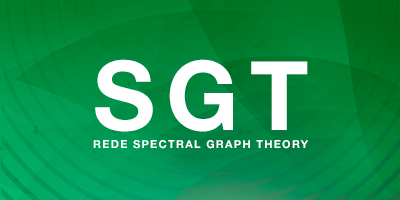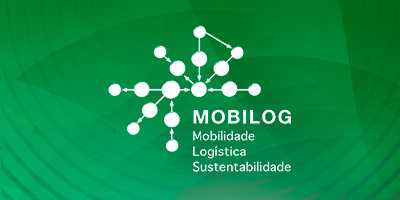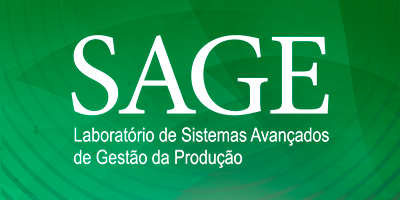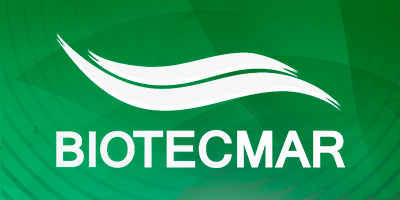Accessibility Tools
 Network Spectral Graph Theory (SGT Network) is a group of researchers from several Brazilian educational institutions coordinated by Professor Nair de Abreu and its vice coordinator Professor Maria Aguieiras. It is linked to the research line Modeling and Optimization of PEP, with the objective of developing themes in the area of Spectral Graph Theory, with emphasis on Structural Graph Properties, Combinatory Optimization, Network Connectivity and Vulnerability, Network Centrality Measures, M Graphs - integral, among others.
Network Spectral Graph Theory (SGT Network) is a group of researchers from several Brazilian educational institutions coordinated by Professor Nair de Abreu and its vice coordinator Professor Maria Aguieiras. It is linked to the research line Modeling and Optimization of PEP, with the objective of developing themes in the area of Spectral Graph Theory, with emphasis on Structural Graph Properties, Combinatory Optimization, Network Connectivity and Vulnerability, Network Centrality Measures, M Graphs - integral, among others.
The SGT Network has consolidated scientific ties with groups of researchers from Portugal, Chile, the United States, Canada, Argentina, Serbia, with an expressive number of joint publications in international journals and the holding of international congresses in Rio de Janeiro with the participation of researchers consecrated in the area.
 The Problem Structuring and Indicators Group for Modeling and Assessment (PSIGMA) ims to develop and apply methodologies to integrate formal models - generally quantitative - with qualitative contextual models, based on metacognitive maps. It is aligned with the English school's problem structuring methods, but differs in the following aspects:
The Problem Structuring and Indicators Group for Modeling and Assessment (PSIGMA) ims to develop and apply methodologies to integrate formal models - generally quantitative - with qualitative contextual models, based on metacognitive maps. It is aligned with the English school's problem structuring methods, but differs in the following aspects:
The Complex Holographic Assessment of Paradoxical Problems (CHAP2) method developed and used by COPPE is a multi-methodology, because we understand that every complex problem requires a bifocal, qualitative and quantitative approach, without losing the perspective of the context and the concrete intervention.
It is based on the theory of paradoxes of complex systems (such as metacognition x self-deception), since it is not always possible to accommodate divergences, as the methods proposed by the English school, but rather to manage the polarities dialogically, keeping the convergences and divergences in perspective.
The group has worked mainly in the health sector, producing results recognized by several institutions, such as the Brazilian Beneficent Association for Rehabilitation (ABBR), Faculty of Dentistry at UFRJ, National Institute of Traumatology and Orthopedics (INTO), UFRJ University Hospital, TCU and World Bank. The projects for such institutions resulted in a reduction in manufacturing time, discussion of scenarios to reduce the loss of resources, presentation of diagnosis and proposals for intervention in the supply logistics processes, as well as the evaluation and recommendations about health performance in Brazil and in the world. In addition to working in health, the work in the education area stands out, with projects involving INEP and CAPES through analysis showing the inconsistency of the multilevel regression model and the correction of results for performance indicators.
 Visit the Psigma website. Visit the Psigma website. |
 The MobiLog - Mobility Laboratory, Logistics and Sustainability is a research laboratory linked to the Production Engineering Program (PEP) of Coppe / UFRJ and is coordinated by Professor Lino G. Marujo. It acts in a transdisciplinary way, from a new perspective on operations management, mobility and logistics based on the triad Collaborative Economy, Circular Economy and Digital Economy. Among the areas of expertise is the development of extended supply chains, industrial symbiosis, circular and digital business models, socio-environmental assessment based on Life Cycle Thinking methodologies, urban mobility and logistics, sustainable logistics networks, simulation and use and Big Data treatment.
The MobiLog - Mobility Laboratory, Logistics and Sustainability is a research laboratory linked to the Production Engineering Program (PEP) of Coppe / UFRJ and is coordinated by Professor Lino G. Marujo. It acts in a transdisciplinary way, from a new perspective on operations management, mobility and logistics based on the triad Collaborative Economy, Circular Economy and Digital Economy. Among the areas of expertise is the development of extended supply chains, industrial symbiosis, circular and digital business models, socio-environmental assessment based on Life Cycle Thinking methodologies, urban mobility and logistics, sustainable logistics networks, simulation and use and Big Data treatment.
The objectives of MobiLog are:
- Offer innovation to the mobility and logistics sector;
- Make logistics more efficient, productive, greener, safer;
- Transform city logistics into a pillar of sustainable socio-economic development.
It is one of several " Knowledge Hubs" that are in the spheres of activity PEP / COPPE / UFRJ. As a Knowledge Center, MobiLog - Living Lab proposes to be the link of a fragmented transport and logistics industry to innovation and best practices in sustainability in supply chains. Activities with the objective of making the transport and logistics sector in RJ and the country more productive, efficient, more sustainable and safer.
The approach guided by technology and industry practice can address points of inefficiencies, criticisms of the interfaces involved, lack of standardization and fragmented visibility of the end-to-end in transport and logistics processes. MobiLog explores new ways to orchestrate transport and logistics services through multiple service providers, modes of transport and technologies.
 The Rogério Valle Center for Sustainable Production (SAGE) was created in 1995 to develop an innovative and advanced way of sustainably producing goods, services and events; the way in which technical, economic, social and environmental criteria are integrated. For this, SAGE acts in an interdisciplinary way, thanks to its own team that includes engineers, chemists and marine biologists, in addition to several partnerships with other laboratories at UFRJ. It is currently coordinated by Professor Virgílio José Martins Ferreira Filho, and its mission is to act in the reflection, qualification and innovation of the ways of producing goods and services, integrating technical, social and environmental criteria, training people and developing research to involve society in sustainable production.
The Rogério Valle Center for Sustainable Production (SAGE) was created in 1995 to develop an innovative and advanced way of sustainably producing goods, services and events; the way in which technical, economic, social and environmental criteria are integrated. For this, SAGE acts in an interdisciplinary way, thanks to its own team that includes engineers, chemists and marine biologists, in addition to several partnerships with other laboratories at UFRJ. It is currently coordinated by Professor Virgílio José Martins Ferreira Filho, and its mission is to act in the reflection, qualification and innovation of the ways of producing goods and services, integrating technical, social and environmental criteria, training people and developing research to involve society in sustainable production.
The objective of SAGE is to develop an innovative and advanced way of sustainably producing goods, services and events, considering its life cycle in an integrated manner through technical, economic, social and environmental criteria. SAGE acts primarily where production management and sustainability need to meet, using mainly Life Cycle Management and Multicriteria Sustainability Assessment.
Its main activities are related to Support for multicriteria decision in decommissioning projects. Monitoring, prevention and recovery of natural and environmental disasters; and environmental preservation. Life Cycle Assessment (LCA), including environmental, social and life cycle cost analysis; - assessment of life cycle sustainability in a multicriteria approach; theoretical and practical training (in software) of LCA. Assessment and monitoring of biodiversity, particularly marine. Classification methods and selection of alternatives for making complex decisions involving multiple criteria. Its projects have made SAGE a national reference in Process Management (mapping and rationalization of processes, competence management, ERP Systems, Electronic Document Management and Workflow). It is a certified trainer and GRI stakeholder organization. For the IOC, it carried out the Sustainability Assessment of the Rio 2016 Olympic Games (OGI).
 Visit the SAGE website Visit the SAGE website |
 The Marine Biotechnology Laboratory (BIOTECMAR), coordinated by Professor Fabiano Thompson, develops innovative research on the themes of biodiversity, pathogens, contaminants, prospecting, genomics, post-genomics, computational biology, and transfer to the productive sector. It develops biosensors applied in the industry (pollution monitoring: domestic and industrial sewage, oil spills and ore tailings) and for environmental monitoring. It also develops pioneering studies on reef systems, Greater Amazonian Reef, Abrolhos, oceanic islands (São Pedro and São Paulo, Trindade, Abrolhos), coastal region (Rio de Janeiro coast, Guanabara Bay and deep sea, and Antarctica, aiming to develop biotechnological products and processes, and understand the functioning of these marine systems. Development of new therapeutic products to combat infectious diseases from marine biodiversity. It also develops studies on water quality and water security in several river regions of the country (including Amazonas, São Francisco Rivers, Contas, Paraguaçu, Doce, Paraopeba, and Guandu) Coordinates the MCTIC BIOTECMAR National Network.
The Marine Biotechnology Laboratory (BIOTECMAR), coordinated by Professor Fabiano Thompson, develops innovative research on the themes of biodiversity, pathogens, contaminants, prospecting, genomics, post-genomics, computational biology, and transfer to the productive sector. It develops biosensors applied in the industry (pollution monitoring: domestic and industrial sewage, oil spills and ore tailings) and for environmental monitoring. It also develops pioneering studies on reef systems, Greater Amazonian Reef, Abrolhos, oceanic islands (São Pedro and São Paulo, Trindade, Abrolhos), coastal region (Rio de Janeiro coast, Guanabara Bay and deep sea, and Antarctica, aiming to develop biotechnological products and processes, and understand the functioning of these marine systems. Development of new therapeutic products to combat infectious diseases from marine biodiversity. It also develops studies on water quality and water security in several river regions of the country (including Amazonas, São Francisco Rivers, Contas, Paraguaçu, Doce, Paraopeba, and Guandu) Coordinates the MCTIC BIOTECMAR National Network.
 Visit the BIOTECMAR website.
Visit the BIOTECMAR website.
